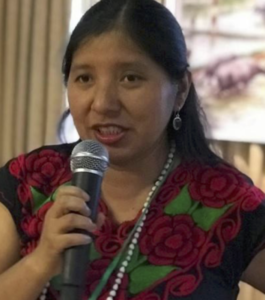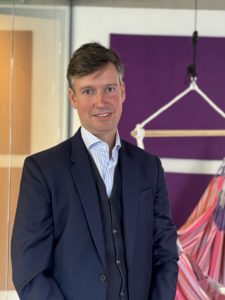The Tenure Facility is governed by a Board of Directors composed of leading individuals from Indigenous Peoples, community organisations, civil society, international development and the financial sector. The Board is the foundation’s highest decision-making body and guides strategy, policies and budgets.

Joan Carling is an indigenous activist from the Cordillera, Philippines. She has been working on indigenous issues at the grassroots to international levels for more than 20 years. Her field of expertise includes human rights, sustainable development, environment, and climate change, as well as on the principles and application of Free Prior and Informed Consent (FPIC). She was the Secretary General of the Asia Indigenous Peoples Pact (AIPP) – a coalition of 50 indigenous organizations across Asia, from 2008 to 2016. Ms. Carling was appointed by the UN ECOSOC as an expert- member of the UN Permanent Forum on Indigenous Issues (UNPFii) for 2014-16. She is the Executive Director of Indigenous Peoples Rights International (IPRI) and in 2024 she received the Right Livelihood Laureate award by Right Livelihood, a courage-powered community for social change based in Sweden.

Eleni Kyrou is a development practitioner with a background in social development and urban development policy and planning, with 20 years of working experience across most of the global South. She currently serves as Senior Social Development Specialist for the European Investment Bank. Eleni has worked for civil society organisations, research institutions and multilateral/international agencies in the context of urban development and urban governance; access to housing for low income population groups at scale; participatory resettlement and relocation of informal settlers; relief aid and post-conflict reconstruction and rehabilitation. She holds a particular interest and associated experience in promoting socially just development; rights-based approaches to development; collaborative/participatory planning; and, gender in development. She is multilingual – with proficiency in English, Greek, Spanish, French, German, and Portuguese.

Carl is an independent economic advisor. He grew up outside Gothenburg and studied Forestry and Business at university. Later on, he moved to Stockholm and started on what was intended to be a short period at KPMG and stayed for over 30 years ending as chairman. He has an MBA from Warwick University and a bachelor’s degree in geosciences, and an on-going master’s studies in Hydrology as well as Climate Change at Stockholm University. After leaving KPMG in 2013 he directed his efforts into trying to pay back to a world, which involves everything from global issues (climate change, children's rights, etc.) to individual projects (a school in Tanzania, mentorship etc.)

Juan Martinez hails from the Nuu Savi Mixtec Region in Oaxaca Mexico. He is an Independend Indigenous Peoples advisor and former Social Practice Leader (SPL) at the Environmental and Social Solutions Division (ESG) at the Inter-American Development Bank (IADB) where he worked on the implemention of the Social and Environmental (ESPF) Standards such as Indigenous Peoples, stakeholders engagement among others for projects and programs that the IADB finances. Prior to his role as Social Practice Leader (SPL), Juan worked at the World Bank for more than twenty years in multiple regions of the world as a Senior Social Development Specialist these included East Asia and the Pacific; Southeast Asia, Africa (Zimbabwe), Latin America and the Caribbean. During his career he carried out multiple field assignments working close to clients in Indonesia, Central America, and Mexico. In this role he was responsible for leading the practical implementation of social inclusion schemes by identifying ways to ensure the full participation of Indigenous Peoples and local communities in the development processes. Juan has led multiple land and community forestry projects, also worked in multiple other sectors around the world that promote the participation of indigenous peoples and local communities by addressing the fundamental rights to their territories, forests and natural resources.

Dr Mary Hobley is a development practitioner. She has worked for over 35 years in forestry, governance and institutional reform in South and Southeast Asia, Africa and Europe. Over her career she has focused on a range of issues affecting rural livelihoods including forest rights, gender relations, land tenure, migration, local governance and political engagement. She has been closely involved with the development of community forestry both in Nepal and globally, including writing and editing several books. Building on her long engagement in Nepal and internationally, she works as an independent adviser to multilateral, bilateral and non-government organisations focusing her work on the multiple drivers of change including migration and political and institutional processes. She holds a PhD from the Australian National University and worked at the Overseas Development Institute in London as a policy researcher. She is a trustee on the boards of Proforest Initiative and the Commonwealth Forestry Association and has authored and co-authored numerous publications.

Christine Halvorson is the Program Director of Rainforest Foundation US. She oversees the organization's program portfolio working closely with partners in the Amazon and Central America and brings extensive expertise in institutional strengthening, land management planning and titling, policy and campaigning. Prior to joining RFUS in 1999, she was a director of Amanaka’a Amazon Network. She has worked on issues connecting the environment and social justice for nearly thirty years, both in the Amazon as well as locally in New York City where she serves on the board of ABC No Rio, a cultural center in the Lower East Side. She holds a Master’s in Anthropology from The New School for Social Research. She is fluent in Portuguese, Spanish and rusty French.

Viviana Figueroa, Omaguaca indigenous women, has over 20 years of professional experience working on traditional knowledge, indigenous people’s rights and women empowerment and rights. She is an international consultant and member of the Indigenous Women Network on Biodiversity (RMIB), an international indigenous organization working on biodiversity and traditional knowledge. She is also a member of the International Indigenous Forum on Biodiversity (IIFB).She also worked as professor on indigenous people’s rights, legal advisor for the National Congress on indigenous people’s rights, and member of Advisory Committee for UNICEF and the Convention on Biological Diversity.
Viviana holds a PhD in Law and a degree in law from the University of Buenos Aires (UBA), Argentina.

Lesle Jansen is currently serving as the Head of Indigenous Peoples and Local Communities Resource Rights at Jamma International as UK charity supporting community conservation iniatives in Africa. Lesle brings a host of legal experiences in support of communities’ rights with special interests in human rights, indigenous & environmental law, international and regional law, along with forming part of the South African Khoikhoi indigenous communities. She formerly served on the special mechanism for indigenous communities in Africa within the African Commission on Human and Peoples Rights. Throughout her professional journey, Lesle has actively contributed to various aspects of Benefit Sharing, specifically in relation to traditional knowledge and sustainable practices.

Jennifer Corpuz, from the Kankana-ey Igorot Indigenous People of Mountain Province in the Philippines is a lawyer by profession who is currently serving as Managing Director for Nia Tero, a US-based foundation that supports Indigenous guardianship of territory and culture worldwide. Jennifer brings a host of legal and capacity-building experiences in support of Indigenous Peoples, with special emphasis on traditional knowledge protection, human rights, customary governance, FPIC, racial discrimination, land rights, selfdetermined development, biodiversity, climate change, and more. Jennifer has actively participated as a negotiator and expert representing Indigenous Peoples in various international forums, such as in the International Indigenous Forum on Biodiversity (IIFB), the negotiations leading to the adoption of the Nagoya Protocol on Access and BenefitSharing, and the Kunming-Montreal Global Biodiversity Framework under the Convention on Biological Diversity (CBD). Throughout her professional career Jennifer has made important contributions for Indigenous Peoples rights on a global level, as well as important contributions in the promotion of capacity-development for the next generation of Indigenous leaders.

Kaspar Wansleben is the Executive Director of Investing for Development (IforD), an impact asset manager based in Luxembourg. In his role, Kaspar oversaw the launch and growth of funds dedicated to inclusive finance, tropical forest restoration, and gender equality.
Professionally, he has been concerned with the mobilization of debt, equity, and grant funding for development in less and least developed countries, including widening financial access for forest communities.
Kaspar has a background in development finance and microfinance, acquired in particular during his time at the International Labour Organisation (2002) and at PlanetRating (2004) and in his role in structuring the different impact funds. Kaspar held several board positions at sector organizations, investees and networks.
Kaspar has an audit and corporate finance background and is a fellow chartered accountant of the Institute of Chartered Accountants of England and Wales. He started his career at KPMG Luxembourg.
Kaspar is a member of the Luxembourg High Council for Sustainable Development and a visiting lecturer at the University of Luxembourg on social entrepreneurship.